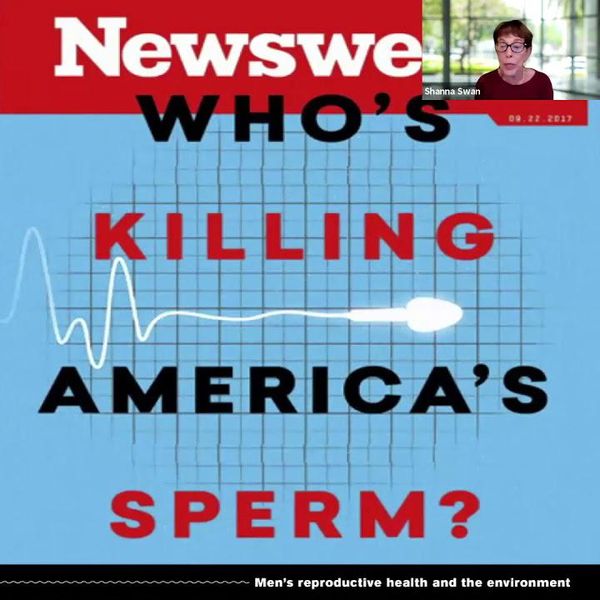
Understanding of the relationship between chemicals and pollutants and reproductive health is advancing rapidly—and now you can have access to leading experts to stay on top of the latest science and ways to improve your health.
Evidence shows that pollutants and toxic chemicals have an impact on a number of reproductive health outcomes and disorders, including infertility, sperm count decline, adverse birth outcomes, and endometriosis. Yet many health professionals, policy makers, advocates, and patients are not fully aware of the research on toxic chemicals and the implications for public health and patient care.
Generation Chemical: How Environmental Exposures are Affecting Reproductive Health and Development
To better connect and educate researchers, health professionals, policy makers, advocates, and patients, the Collaborative on Health and the Environment and the University of California, San Francisco Program on Reproductive Health and the Environment and Environmental Research for Health and Translation Center created a seven-part webinar series featuring presentations by top environmental health scientists and experts on how environmental exposures are affecting health and human development.
From fetal development and birth outcomes to pregnancy, menopause, and beyond, the webinar series features leading authorities discussing the cumulative impacts of toxic chemicals such as phthalates and BPA and pollutants such as air pollution.
We’ve already held two webinars. Here are some highlights so far:
- Dr. Shanna Swan, of the Mount Sinai School of Medicine presented evidence that exposure to environmental chemicals, like phthalates, are linked to the groundbreaking finding that sperm count is declining 1 percent per year in Western countries. “These declines are really rapid and are unlikely to be genetic because they are so rapid. That means they are environmental,” said Dr. Swan.
- “Early life is highly susceptible to chemical exposures due to the rapid development of the fetus from a single cell to a walking individual in two years,” said Dr. Jessie Buckley of Johns Hopkins University, who discussed how only a fraction of chemicals that are used have been measured and studied in pregnant women or children. “Exposures during these critical windows can cause permanent changes to the structure and function of body systems,” Dr. Buckley said.
- Dr. Tamara Jones-Todd, highlighted evidence that differences in toxic chemical exposures are leading to racial disparities in reproductive health outcomes. “We know that there are links between phthalates and phenols for infertility, subfertility, preterm birth, pregnancy hyperglycemia, endometriosis and fibroids, obesity, diabetes, thyroid disease and early puberty… What people fail to realize is that what could be driving racial differences is that there are higher exposures that impact the underlying biology of the individual.”

There are five more webinars in the series that will dive deep into the science on infertility, pre-conception exposures, fetal development, maternal health, and male reproductive health. Check out the dates and topics below.
Infertility. December 10, 2020 at 10am PDT / 1pm EDT
Latest evidence of the effects of air pollution and phthalates on follicle health, fecundity, and fertility
Preconception Exposures. January 28, 2021 at 10am PDT / 1pm EDT
How exposures to chemicals before couples conceive affect fetal and child development
Prenatal Exposures and Fetal Outcomes. February 2021, Date TBD.
Impacts of oil and gas development, pesticides, phthalates and social stressors on increased risk of autism and adverse birth outcomes.
Prenatal Exposures and Maternal Outcomes. March 2021, Date TBD.
How prenatal exposures to chemicals including flame retardants, plasticizers, pesticides, lead, and PFAS are linked to adverse maternal health outcomes.
Male Reproductive Health. April 2021, Date TBD.
How air pollution is affecting semen quality and how chemical exposures in the workplace can jeopardize health and reproduction.
The series is a partnership with the UCSF Environment Research and Translation for Health Center, the International Federation of Gynecology and Obstetrics, the Endocrine Society, the Alliance of Nurses for Healthy Environments, and the International Federation of Fertility Societies.
To find our more and to join, please visit the Generation Chemical webpage.
Tracy Woodruff, PhD, MPH is the Director of and Alison S. Carlson Endowed Professor for the Program on Reproductive Health and the Environment and is a Professor in the University of California, San Francisco Department of Obstetrics, Gynecology and Reproductive Sciences and the Philip R. Lee Institute for Health Policy Studies.
Karen Wang, PhD, MsC is the Director of the Collaborative on Health and the Environment and founder and editor-in-chief of Because Health.





